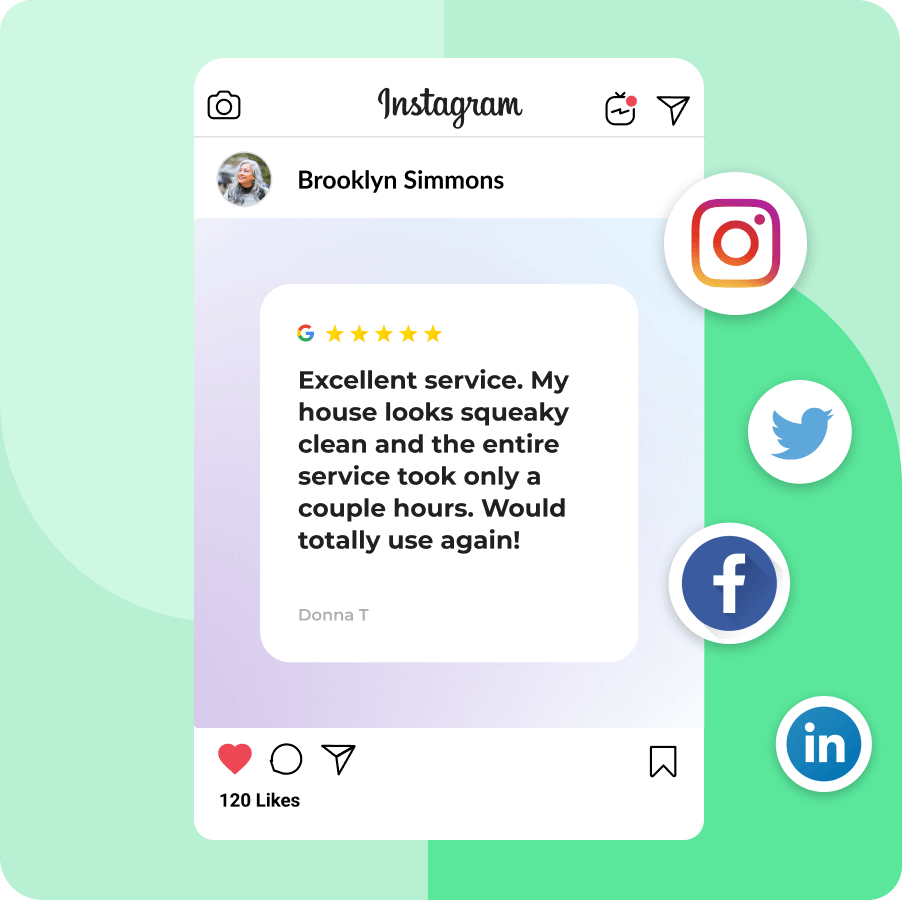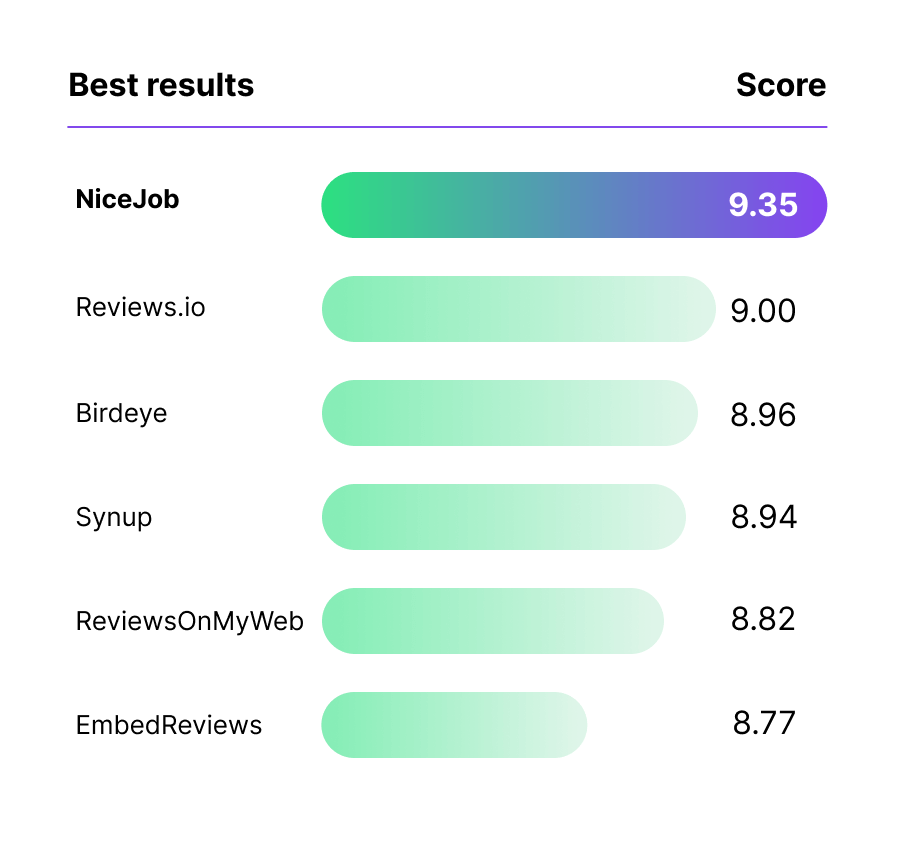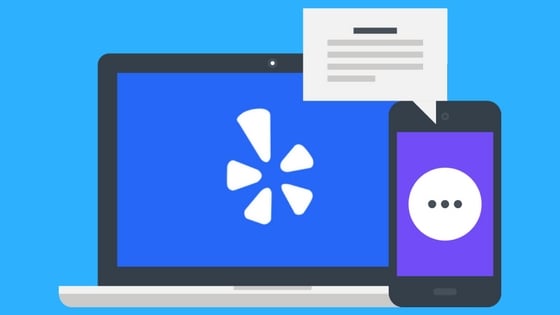Negative Review Response Examples: Responding to Bad Reviews
Examples for How to Respond to Reviews on Google and Facebook
Why Responding to a Negative Review Helps Your Reputation Management Strategy
When it comes to customer feedback, responding to negative reviews isn’t always fun. But it’s rarely an option either.
Potential customers research small businesses by looking at customer reviews to see if a business has a good reputation. This includes how a company handles negative reviews.
A business needs to manage its reputation to improve search rankings and turn website leads into sales. Responding to positive and negative online reviews builds your reputation.
The Impact of Responding to Negative Reviews for Reputation Marketing
Online reviews and having a strong online reputation are important for any small business.
Customer reviews are a big part of your company's reputation. They tell future customers what they can expect by hiring your company or buying your products.
Therefore, collecting and responding to reviews is an essential aspect of reputation management, especially when it comes to negative reviews.
How a company handles negative reviews reveals their character.
Of course, some negative reviews are fake or violate Google's reviews policy. For example, some people or businesses buy negative Google reviews to be posted on competitors' review sites. And in those instances, it's important to know how to report a Google review.
Why Responding to a Negative Review Helps Your Company
Often negative reviews are legitimate and it's important to respond to them.
In some cases, replying to negative reviews gives businesses an opportunity to win a customer back or even mitigate further damage.
For example, replying to negative online reviews shows you care about customer feedback. When people feel listened to, they'll be more likely to support your business.
This contributes positively to your company's reputation and helps to increase referral revenue down the road.
By responding to negative reviews, you can move your business forward with reputation marketing: using your reputation and customer reviews to promote your business.
A good reputation can amplify itself, leading to growth opportunities and more sales. This is the principle at the heart of reputation marketing.
Why Customers Write Legitimate Negative Reviews
Very few customers who are unhappy will actually go out of their way to explain why.
In fact, the number is less than 5%.
So when a customer provides constructive feedback in a negative review, it gives you a rare chance to self-reflect on how your business can improve.
At NiceJob, we conducted internal research to discover the most common topics associated with negative reviews—as defined by any review with only a 1- or 2-star rating.
The three most common topics that popped up more than any other were, in order, unreliable service, poor results and unprofessional service.
These topics beat out other ones such as limited experience, slow responses, dishonesty, expensive prices or difficult to contact.
What does this mean? It means that your customers care about the quality, professionalism and reliability of the end product/service that they receive above all else.
It's likely then that a lot of negative reviews about your business could provide a lot of valuable information about how you can improve your end products/services.
So always take the opportunity when it's appropriate to reply to negative reviews in good faith to see how your business can improve for the future.
Importance of Online Reviews and Responding to Reviews
Reviews help improve search rankings and conversion rates of website visitors into leads.
But how a company responds to its reviews is just as essential. Responses to reviews are public and attached to the reviews themselves, so potential customers can see them.
Therefore, they can make an impression on your potential customers, which is important because according to online review statistics, 97% of people say reviews impact their decisions.
So how can you better manage your reputation and handle negative online reviews to keep your business moving forward?
How to Respond to a Negative Review
There’s a number of things to consider when responding to negative reviews on Google, Facebook, Yelp or similar review sites.
We'll overview six key things for replying to negative customer feedback and provide six example templates of how to respond to negative reviews of your business.
Remember to personalize each review response and avoid canned responses. Use these examples as a guide for your own responses so you can turn those frowns upside down!
6 Tips for Responding to Negative Reviews
- Respond promptly to negative feedback
- Be professional when replying to bad reviews
- Keep it brief
- Provide a public response and then take the conversation offline
- Know when to respond and when to let it lie
- Learn how to handle negative reviews and crisis management
Turn your positive reviews into your best marketing assets!
NiceJob’s set-and-forget review software automatically gets you reviews and shares them on Facebook, Instagram, and more so you can become top rated.
See how it works
1. Respond Promptly to Negative Feedback
We'll get to how to respond to negative comments. But there's another question you nee to ask: when should you respond to a negative review?
Most consumers expect a detailed and, ideally, positive response within the same day.
Respond quickly to negative reviews to address the situation in a timely manner. Monitor reviews often to know when an unhappy customer has left a negative review.
2. Be Professional When Replying to Bad Reviews
How you respond to negative reviews on Google, Facebook or Yelp matters. Don't get personal and blast off an angry rant when replying to a negative review.
Your reply isn't just for an individual but for everyone else too. How you respond to a dissatisfied customer can influence a future customer's decision to choose your business.
3. Keep it Brief
When writing a response to a negative online review, keep it brief and to the point. Steer the customer towards having a conversation to resolve the issue and suggest taking it offline.
4. Provide a Public Response and Then Take the Conversation Offline
Respond in public to negative customer feedback and when suitable, take things offline.
Replying to negative reviews on Google, Facebook or Yelp allows you to provide context and show that your business works to make customers happy.
Once resolved, return to the original review and thank the customer for the chance to fix the issue.
5. Know When to Respond and When to Let it Lie
You can’t fix every negative review. Some responses open you up to more negative attention.
Determine if engagement is the right course of action and ignore angry rants. Sometimes you have to stand your ground (see response #7 below), but know where to draw the line.
6. Learn How to Handle Negative Reviews and Crisis Management
Sometimes negative sentiments encourage bandwagon-jumpers. Every situation is different, but no situation calls for confrontation or excuses.
Tackle the issue head-on and own your mistakes.
If a situation creates a stream of unhappy people knocking on your door, make sure your support team is trained in crisis management and knows how to handle a difficult customer.
For instance, take the conversation offline as soon as it's appropriate, try to focus on facts & not feelings, stay clam and offer solutions as best you can.
Now let's jump into the negative review response templates!
7 Review Response Templates for Negative Reviews
Templates for How to Respond to Negative Reviews
You're going to want to bookmark these negative to positive review response templates.
- Hello [NAME],
We would like to apologize for your recent experience. We're sorry to hear you were less than satisfied with [product/service].
We pride ourselves on our [product/service] and the high quality standards we maintain. We would like to make things right.
You can expect a [call/email] from [name] soon to discuss what occurred and how we might make it up to you.
Yours sincerely,
[Name]
[Company name and/or position]
- Hello [NAME],
We’re sorry to hear of your less-than-satisfactory experience with [Company] and hope you will accept our sincerest apologies.
Being known for our great [customer service/product/service], we would like to make things right.
We will reach out soon and you should get a [call/email] from [Name] to determine how we can provide a solution that makes you smile.
If you prefer, you can also contact us directly at [phone/email].
We value our customers' opinions and would like to thank you for bringing this to our attention.
Yours sincerely,
[Name]
[Company name and/or position]
- Hello [NAME],
My name is [Name] and I am the [manager/owner] here at [Company].
I’m sorry to hear about your disappointment with us and I would like to personally assist you with making things right.
I will reach out today to discuss, or you can contact me directly at [phone/email] if it's more convenient.
Let’s get on a call and address this ASAP; we value your business.
Yours sincerely,
[Name]
[Company name and/or position]
- Hello [NAME],
We understand your disappointment with [Company] and agree that this is not acceptable.
It’s important to us that our customers are more than satisfied and we would like the opportunity to resolve this issue immediately.
If you give us a chance, we intend to make this right and hope you will allow us to speak with you to discuss the situation.
Please give me a call at [phone] at your earliest convenience.
Yours sincerely,
[Name]
[Company name and/or position]
- Hello [NAME],
We’re so sorry this happened. Let us make it up to you. We’ll be in touch today, or please give me a call at [phone] if it's more convenient.
Yours sincerely,
[Name]
[Company name and/or position]
- Hello [NAME],
You’re right — this is unacceptable. I can’t imagine how this may have happened, but if you allow me the chance to speak with you at your earliest convenience, I would like to make it right so we can get this sorted.
My number is [phone] or you can email me at [email].
I’m sorry this happened and look forward to speaking with you.
Yours sincerely,
[Name]
[Company name and/or position]
- Hello [NAME],
My apologies about your experience with our company.
You indicated that [X, Y and Z] are the reasons for your dissatisfaction. However, our records in your account indicate that [X, Y and Z] did not occur as you described them. For example, [respectfully provide specific details if appropriate and relevant].
We pride ourselves on our reputation in the local community and welcome further discussion to hopefully resolve your issue. If you'd like, please contact me directly at [phone/email].
Yours sincerely,
[Name]
[Company name and/or position]
You'll notice that we didn't include any funny responses to negative reviews (maybe that's for another article). We've already got one written for positive review response examples if that's what you were looking for!
It may be fitting for some brands but for the average business owner, the best and most effective approach is to empathize with your dissatisfied customer and respond them them in a serious and apologetic tone.
Responding to Online Reviews for Business Reputation Management
It can be difficult to receive anything other than a positive review or positive feedback. But maintaining your integrity is important for reputation management. About 90% of customers trust online reviews and many read review responses.
When responding to negative reviews of your business, keep it succinct, be prompt with your reply and be professional.
Provide a public response and when suitable, suggest taking it offline. Once resolved, return to the online review and thank your customer for allowing you to fix the situation.
Remember, less than 5% of dissatisfied customers say why they’re unhappy. So the unhappy customers who share their negative experiences are doing your business a favor.
How to Reply to Google Reviews and More With NiceJob
Staying on top of reviews—positive or negative—can be time-consuming and inefficient.
With NiceJob's reputation marketing software, automatically collect and share positive reviews from happy customers and effectively respond to reviews for Google, Facebook and Yelp.
With a free 14-day trial, you can see for yourself how easy it is to leverage customer reviews for your marketing efforts with no upfront commitment.
NiceJob is #1 For Reputation Marketing
Our customers have rated us the top software for small businesses in the following categories:
-Best results
-Easiest to implement
-Easiest to use
-Best customer service





